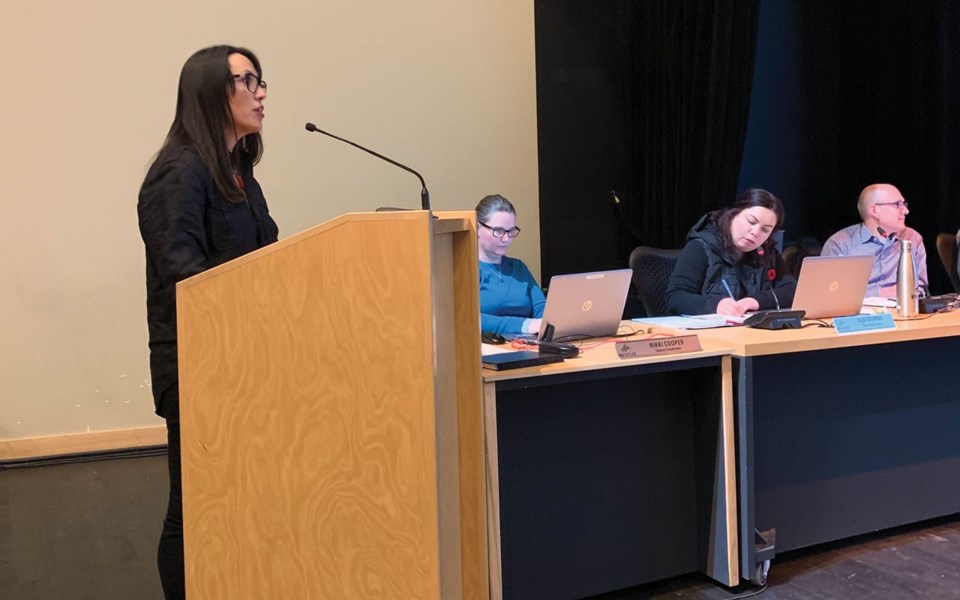In a rarity for the usually sparsely attended council meetings, close to 40 Whistlerites came out on Tuesday, Nov. 5 to hear the municipality's quarterly update on its Community Energy and Climate Action Plan (CECAP).
Organized by the Association of Whistler Area Residents for the Environment and former Resort Municipality of Whistler (RMOW) communications staffer Randi Kruse, the gathering was in response to the municipality's seeming inaction on its overarching climate plan since it was adopted in 2016.
"Over three years ago now, the community supported your significant investment in creating this climate action plan," Kruse said while addressing council in the Q&A period before the presentation. "I think many people are here tonight ... because we're concerned that this community mandate is not being pursued as aggressively as it needs to be."
Whistler's ambitious climate plan, which aims to cut the community's 2007 greenhouse gas emissions by a third by next year—a target the resort is not on pace to meet—includes 134 specific actions to be completed in the short-, medium- and long-term.
Of the 94 actions in the "Mitigation" section, which mostly comprises energy and emission goals, 42 are in progress, 18 are continual, ongoing efforts, five are completed, and 29 have not been initiated. (Some of the items do not have an action status listed in the report, which the RMOW later clarified means they have not been initiated.)
Of the 40 actions listed in the "Adaptation" section, which includes minimizing the threat of wildfire, traffic congestion, and ensuring an adequate water supply, two are in progress, 10 are ongoing, and 27 have not been initiated.
Short-term goals make up the majority of the CECAP—73 in all. Of those, only two have been completed, while 19 are ongoing and 23 are in progress. Twenty-nine short-term actions—or 40 per cent—have not been initiated.
Crompton acknowledged "the long walk ahead" for the RMOW, while highlighting some of the work that's already underway, such as investing in local public transit, pushing the province for a regional transit model (see related story here), and installing electric vehicle-charging stations.
"We are committed to implementing this and doing the work that we need to do to take action. In my opinion, we are moving in the right direction, but there is significant work to do," Crompton said.
Single-occupant passenger vehicles continue to be the No. 1 driver of emissions locally, and together with natural gas use in buildings, make up 90 per cent of Whistler's GHG output. To that end, Whistler now requires higher energy performance for new residential buildings as part of its adoption of the Energy Step Code. In coordination with the province, the RMOW has also increased energy-efficiency rebates for homes and has begun discussions with the hotel sector to encourage "creative climate and clean energy initiatives," according to the report.
On the vehicle emissions front, the RMOW has reduced the cost of monthly bus passes and offers free public transit on summer weekends and holidays in an effort to increase transit usage. At its Nov. 5 council meeting, the RMOW also announced plans to launch a pilot program in 2020 that will offer free transit to Whistler high-school students, aimed at reducing highway congestion by cutting down on "parent chauffeur" trips. That initiative will be funded through the increase in revenue expected by adjusting the cost of a monthly parking pass for Day Lots 1 to 3 from $50 to $60, another effort the RMOW hopes will encourage more transit use locally. (See related story here.)
One of the long-called for actions in the CECAP that has been completed is the hiring of a climate change coordinator, Maximillian Kniewasser, whose main priority, as listed in Tuesday's update report, is to "accelerate the transition away from fossil fuels by identifying and advancing high impact initiatives in the transportation and buildings sectors, and to engage with key stakeholders and the broader Whistler community to create buy-in for strong action."
Part of that engagement effort will be to increase the frequency of community and stakeholder consultation on climate-related initiatives. That will entail a website re-design and more active social media presence to better inform residents on local climate action and more frequent climate-specific outreach and input from the community on CECAP implementation and priorities.




